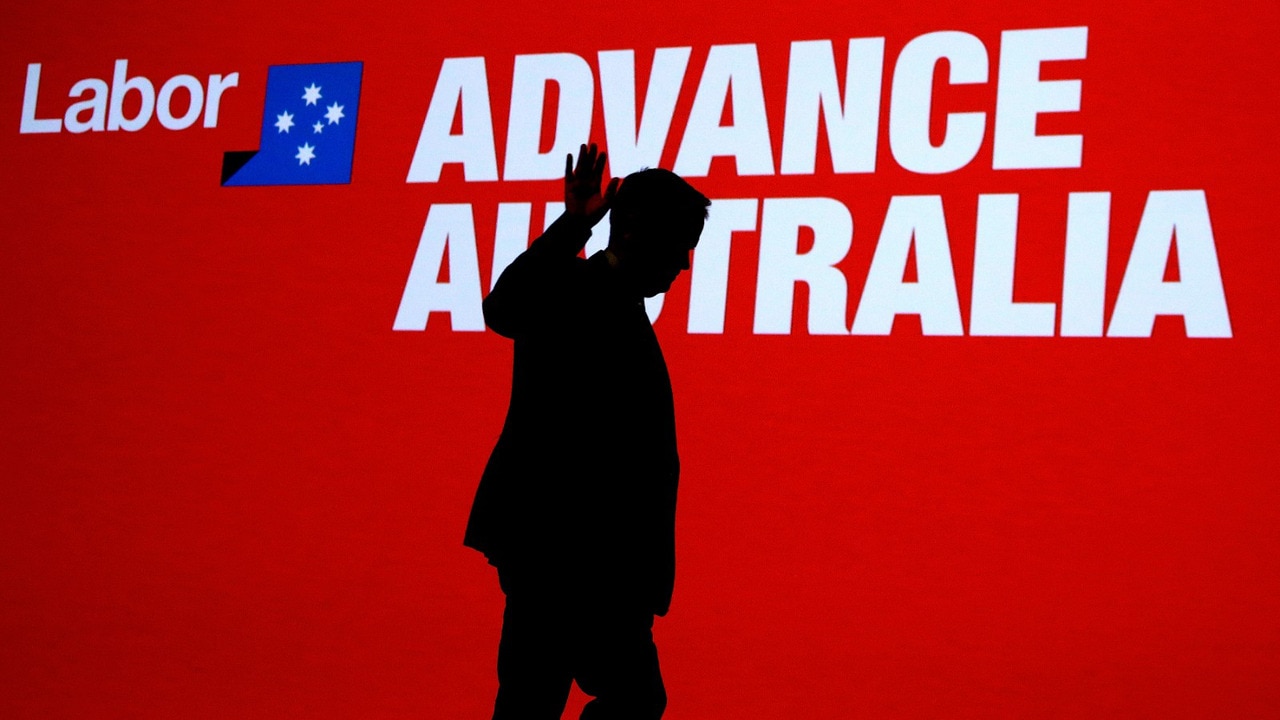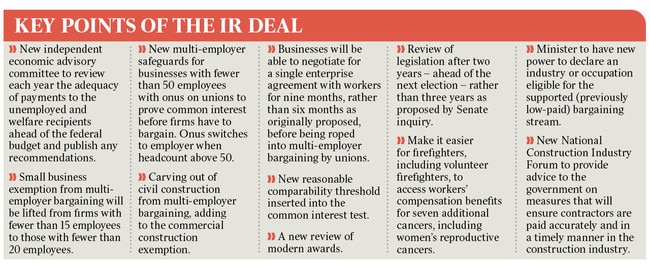Anthony Albanese gives ground to pass industrial relations bill
The bill will be legislated after a deal with David Pocock that widens exemptions for small businesses and commits to reviewing welfare payments each year.

Labor’s industrial relations bill will be legislated this week after the government struck a deal with key Senate crossbencher David Pocock that widens exemptions for small businesses to the expanded multi-employer bargaining regime and commits to reviewing the adequacy of welfare payments each year.
Anthony Albanese hailed the breakthrough as a “huge day for working people” while the union movement said the agreement to pass the bill, reached after 12 hours of negotiations between the government and Senator Pocock on Saturday, would open the way for higher wages.
Business groups criticised the deal, warning the concessions Senator Pocock extracted did not address their deep concerns that the policy changes would lead to more strikes and job cuts.
The government has agreed to new multi-employer safeguards for businesses with fewer than 50 employees, with the onus on unions to prove common interest before firms have to bargain. However, in an important element, the onus switches to the employer when the headcount goes above 50.
Businesses will be able to negotiate for a single enterprise agreement with workers for nine months, rather than six months as originally proposed, before being roped into multi-employer bargaining by unions.
A new reasonable comparability threshold will be inserted into the common interest test while civil construction will be carved out from multi-employer bargaining, adding to the commercial construction exemption.
The legislation will be reviewed after two years – ahead of the next election – rather than three years as proposed by Senate inquiry.

Ensuring that the government would have the numbers in the Senate, the Greens also agreed to back the bill after securing changes that would give parents an enforceable right to request unpaid parental leave. The Greens also secured agreement from the government that changes to the test to approve pay deals would not leave workers inadvertently worse off.
Senator Pocock said that critical to his support was the government’s commitment to establish in legislation an expert advisory committee, led by the treasurer and social services minister, to review the adequacy of support payments annually ahead of each federal budget, and publish their recommendations.
The committee will report ahead of the next federal budget, potentially opening the way for the government to increase payments to the unemployed and welfare recipients from next year.
“In what I believe will be a game changer for people living below the poverty line in our
country, the government will now also receive independent expert advice that is made publicly available before each federal budget looking at how the most vulnerable in our community are faring and what needs to change to ensure we don’t leave them behind,” Senator Pocock said.

Under the changes to the industrial relations bill, the small business exemption from multi-employer bargaining will be lifted from firms with fewer than 15 employees to those with fewer than 20 employees.
Senator Pocock said the package of measures struck the right balance between ensuring people started receiving long overdue wage rises, maintaining productivity and protecting the most vulnerable in our communities.
“This is now a substantially different bill to the one introduced in the House of Representatives a month ago,” Senator Pocock said. “It is better for business, better for workers and makes sure the most vulnerable in our community are no longer left behind.
“I have worked with the government to push them as far as they would go, and then a step further to ensure they addressed key concerns raised with me.
“This legislation introduces significant reforms to Australia’s industrial relations system that will benefit women and low-paid workers in particular.
“There are now additional safeguards in place for business, especially small businesses, and some important new powers to better protect the low paid and those reliant on government support.”

Workplace Relations Minister Tony Burke said the laws would ensure that companies that did not want to engage in multi-employer bargaining would take part in enterprise bargaining. He said employers had found the “better off overall test” to be “horrifically legalistic and complex” and the changes would make it more workable.
The government will increase the minimum bargaining period for the purpose of an intractable bargaining declaration from six to nine months.
It will also remove the right to veto an agreement by allowing the Fair Work Commission to compel a multi-enterprise agreement to be put to a vote regardless of whether unions agree and prevent parties from unreasonably withholding agreement.
Mr Burke said parliament would sit on Saturday for the first time in nearly two decades in order to pass Labor’s major industrial relations reforms.
He said Labor would move to suspend standing orders on Thursday afternoon rather than adjourn the house, and return on Saturday at 9am to accept the Senate’s amendments to its Secure Jobs, Better Pay bill.
The Senate is already scheduled to sit an extra day on Friday as the government seeks to pass its national anti-corruption commission legislation and industrial relations reforms.
Greens leader Adam Bandt announced the Greens had agreed to back the government’s industrial relations bill after securing “significant additional improvements”, including giving parents an enforceable right to request unpaid parental leave and ”protecting” the existing better off overall test.
“The Greens strongly back most of what is in this bill, including abolishing the ABCC and multi-employer bargaining, but we wanted to ensure low paid workers wouldn’t go backwards because of some of the changes,” Mr Bandt said.
“This is an important win for all workers, especially low paid workers in the retail and the hospitality industries.
The ‘better off overall test’ has been preserved.”







